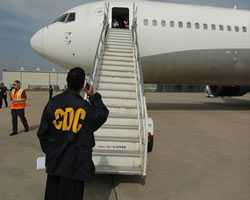CDC's Role in Global Health Security
Multiple Roles

CDC prevents, detects, and responds to the spread of disease at U.S. ports of entry, such as the airport seen here.
As the nation’s premier public health agency, CDC has multiple roles in shaping and executing the global health agenda:
- Coordination: CDC works closely with other parts of the U.S. government and partner nations to help achieve the goal of preventing avoidable epidemics, detecting threats early, and rapidly and effectively responding.
- Technical support: CDC helps partner nations meet global health security goals to prevent, detect, and respond by leveraging existing investments and relationships in global health.
Leveraging Existing Programs
CDC has historic and successful public health programs that align with global health security, including those programs addressing
- global disease detection,
- global influenza,
- vaccine-preventable diseases,
- refugee and border health, and
- training of epidemiologists and others who provide surveillance and investigate disease outbreaks.
Expertise
CDC also has unique and unmatched expertise in
- identifying, developing and validating new tools for disease detection and control;
- applied research on infection control strategies (including antimicrobial resistance and animal-human-environment interface);
- managing public health emergencies;
- laboratory strengthening and improved tools for diagnosing disease; and
- disease monitoring, such as for cholera, hemorrhagic fevers, influenza, and rabies.
Experience With Large Public Health Programs
Finally, CDC has a long history with large, successful public health programs such as the President’s Emergency Plan for AIDS Relief (PEPFAR), the President’s Malaria Initiative, Global Disease Detection Centers (GDD), the Field Epidemiology Training Programs (FETP), the Epidemic Intelligence Service (EIS), and other disease-specific programs. These gold standards in public health have been widely embraced and adopted by other nations, broadening the health security net by developing technical skills, increasing laboratories, and connecting information systems to improve decision-making and prevent, detect, and respond to diseases more effectively.
- Page last reviewed: December 23, 2014
- Page last updated: December 23, 2014
- Content source:
Global Health
Notice: Linking to a non-federal site does not constitute an endorsement by HHS, CDC or any of its employees of the sponsors or the information and products presented on the site.


 ShareCompartir
ShareCompartir